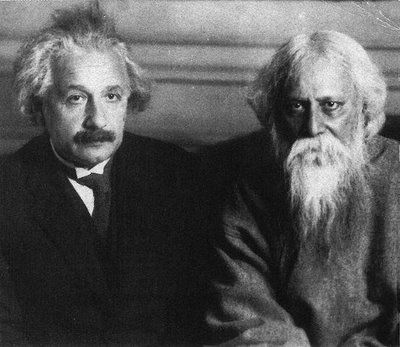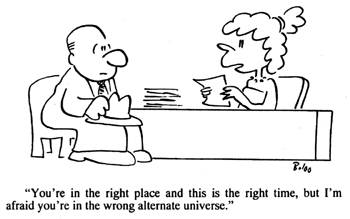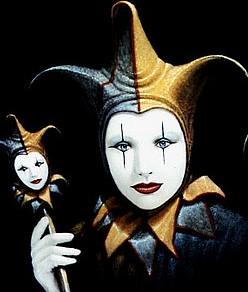When I die and they lay me to rest,
Gonna go to the place that’s the best…?

An informal poll amongst a few friends produced the following results.
- I believe in an afterlife — 2
- I believe in reincarnation –0
- When I die, that’s it. The end — 4
- I will be absorbed into an Overmind/universal soul — 0
- The self doesn’t really exist, so it can’t die –0
- The world is a shared dream, death mere awakening — 0
- Why discuss death when we don’t understand life? — 0
- Other — 2
Part of me thinks the four who voted “Th-th-that’s all, folks!” are right; however, I have a few caveats that make me think that perhaps the right answer is: “you’re right, but…”
The trouble, of course, is filling in the dots.
However, I do have those caveats, at least on days with an “R” in them. Such as…
We don’t understand the nature of consciousness.
OK, we do understand the “neural correlates” of it – or bits of it – but that doesn’t necessarily touch on what David Chalmers calls the “hard problem”. Of course, people like Daniel Dennett think Chalmers’ view is wishful thinking, as are any religious beliefs. However, as Raymond Smullyan pointed out, thinking we’ve solved the problem of existence may also be wishful thinking! (Indeed, everything may be, when you examine it closely enough…)
The best analysis of consciousness we’ve managed so far is to suggest that it is “merely” a very complex computation. Or as max Tegmark put it, “this is what data feels like when it’s being processed.”
However, this view also leads to a few caveats. To say the least. (If demolishing the entire edifice of materialism and placing consciousness at the centre of our understanding of the universe can be called a caveat…)
It seems quite incredible to me that the view of consciousness as computation is almost a retread of Descartes’ “Cogito ergo sum” – which doesn’t necessarily mean it’s wrong, of course, but it’s a bit surprising that the best we can do is rephrase a 15th century philosopher. Maybe he was onto something after all? Of course, “Cogito ergo sum” goes too far. It should read “I think, therefore thought exists” (“Catapultam est cogitatio” according to Google Translate). However, the mere existence of thought -which is by assumption a form of computation – entails various things. For example…
If true, it also means that the existence of the outside world become a hypothesis, not a fact. Computations can only study their input data. There is nothing in this theory of consciousness that stops us being in the matrix, for example, or as philosophers like Chuang Tzu put it a few millennia earlier, dreaming. Hence I have a leaning towards the “world is a dream” option in the poll I mentioned above, although I’m not 100% convinced (especially when I stub my toe against Samuel Johnson).
Another part of the idea of consciousness as computation is the fact that if this is the case, we can’t know for certain which system we’re running on – in fact, there are an infinite number of such systems, if we happen to live in a multiverse (or even in an infinite universe). This makes something like “quantum immortality” a possibility, and the poll question can be answered “Other” – because not all of the infinite computations can ever die, and we can only experience the ones that don’t.
In fact, to get a bit more mystical (or logical – this is all stuff studied by logicians), since computation obeys the Church-Turing thesis, then if consciousness is computation it is a property of abstract mathematical relations. This means that all that is required in order for us to be able to think is maths! The external world, perishable bodies, and the rest of the human condition become a mere hypothesis, and indeed some logicians have tried to extract quantum theory from the basis that we are abstract computations … and, amazingly, have had some success. Is it possible that they are right, and that everything we experience is a sort of grand illusion?
Alternatively, we might exist outside of time, or in a timestream that is different from the one we seem to experience. Various mystics and drug users (e.g. Aldous Huxley) have suggested this. And, ofcourse, lots of science fiction writers.
So perhaps we should at least consider the views of various contemporary philsophers, that we are really abstract universal machines (Bruno Marchal, Russell Standish etc).
Or perhaps consciousness is an illusion, akin to a user interface, as suggested by Dennett, Hofstadter, etc.
But then, who is the user?
Almost everything we’ve discovered about the true nature of the world came as a surprise – so we shouldn’t be surprised to find ourselves surprised by what science has to say about the nature of being.
People think they’re being realistic, pragmatic, eschewing wishful thinking and so on when they say they “believe what science tells us – that death is the end.” I got the following delightful reply from a friend of mine when I told him some of the above suggestions – I hope he won’t mind being quoted, since he puts the “realist” view so well:
Interesting stuff there Liz, trouble is I’m a cynic at heart. So I find it impossible to believe the secrets of reality are to be found in substance abuse or that a 15th century thinker has a better insight into creation than modern science.
I’m afraid unless anyone can prove (or even supply some reasonable circumstancial evidence) otherwise, I believe we’re merely a blob of atoms with a tiny electrical current running through of brains. One day, through any number of possible reasons, that electrical current will turn off and it’s good night vienna.
Without that proof, anything else is (IMHO of course) science fiction, religious mumbo jumbo or just wishful thinking.
My contention – and it is only a suggestion, which I will attempt to back up as far as I can – is that “modern science” doesn’t actually say what he suggests it does. It appears to be a lot less certain about the nature of ourselves, and even of reality, than we might think. That is to say, the statement above, in my opinion, has more to do with what might be called “folk science” than the real thing.
“Folk science” is the view of reality that science plus common sense appear to tell us. Without a bit of inside knowledge, at least, it’s the view that time doesn’t slow down when you fly around at high speeds, that apples fall to the ground because a force pulls on them, and that objects can’t be in two places at the same time.
However, as anyone acquainted with 20th century discoveries in physics will tell you, all the above is wrong. We’re really living in wonderland. So what can we be sure about? How about the existence of the universe, the place where those atoms and electric currents, and indeed Vienna, are supposed to reside?
The External Reality Hypothesis
Everything we know comes to us via our senses, possible augmented by various instruments – telescopes, Large Hadron Colliders, etc – but ultimately the only knowledge we have of the outside world are sensory signals. The idea that there really is a material universe out there that could get along fine without us, or what Max Tegmark calls the “External Reality Hypothesis,” depends – amongst other things – on the assumption that our senses are reliable. Does science contain any hints that the ERH could be false? Well, actually, there are a few tantalising hints…
There’s the holographic principle, which claims the universe could really be 2 dimensional. If true, that would mean that space itself is an illusion, or at least part of it is! The fact that the amount of information that can be stored in a given volume is proportional to the surface area of that volume (rather than the volume of the volume) is staggeringly counter-intuitive, for me at least. So, that shows up something weird and counter-intuitive, if nothing particularly to do with minds. There are many other examples of reality not being quite as we imagine it, such as the masses of atoms being almost completely due to the energy holding them together (holding what together, exactly? Well, it turns out that fundamental particles are rather like parts of something called the Poincaré group – a mathematical structure.)
Could it be that Plato was right, and that the universe we perceive is only a distorted shadow of an underlying reality of perfect forms? The Poincaré group could be one such form…
Quantum Immortality
The wonderful Raymond Smullyan, 91 years old and hailing from a place called Far Rockaway (I never doubted it for a moment) had a few things to say about this…
I am afraid that the whole problem of survival is intimately bound up with our very notions of time, which – except for purposes of science and practical, everyday living – are none too satisfactory As I said at the beginning of this essay, I suspect that all thinking about these questions is somehow off the track, and I certainly don’t except my own. My hunch is that those who believe in immortality are closer to the truth than those who do not but still miss the real point.
I would like to suggest that science does offer a way in which people’s minds may survive – or rather avoid – their bodily death (not necessarily in a very pleasant manner; some may even prefer oblivion. But then science is never very kind towards our preferences).
This is the theory known as “quantum immortality”.
Since 1957, more and more physicists have accepted that Hugh Everett III’s “Relative State Formulation” of quantum theory (also known as the Many-Worlds Interpretation, or MWI) may well be a correct description of reality. It certainly explains much weirdness without introducing any game-changing stuff like FTL travel or the end of causality as we know it. For example, it explains quantum randomness, how atoms can be in two places at once, Bell’s Inequality, the EPR paradox and lots of other stuff. And it uses no extra assumptions above the basic formulation of quantum mechanics – i.e., it’s the outcome you get if you just apply the equations and make no further assumptions about “collapse of the wave function” or “pilot waves”.
The only “problem” with the MWI is that it requires the existence of lots of parallel worlds, or to be exact, it requires that reality is a lot bigger than it looks – that we are only seeing a tiny slvier of the whole thing, which is usually called the “Multiverse“.
We should be used to this by now, of course! – it isn’t even one measly little century ago that we (or rather Edwin Hubble) first discovered that the universe is bigger than the Milky Way! It’s only about 5 centuries since we discovered that it’s bigger than the solar system, and maybe 10 since we realised it was bigger than the Earth plus a few crystal spheres. So no surprise there, you’d think… especially since, in about 1970, the one big problem with the MWI was solved.
However, the MWI leads to a bit of a stunning problem (or perhaps it isn’t exactly a problem…) – namely, it suggests that, for any given situation, all the outcomes predicted by quantum theory occur. Let me take an example. There is a small chance that all the atoms in an object, say my coffee cup, will spontaneously undergo fusion. This means there is a small change of a nuclear explosion in my study. According to the MWI this is actually happening, in some parts of the multiverse. There are also (very small) regions of it in which unicorns are materialising. Even, somewhere, a TARDIS… 🙂
In fact, anything physically possible is happening somewhere in the multiverse. Your secret fantasy. Your worst nightmare. The contents of every book ever written, assuming they are physically possible, are being acted out somewhere… even Harry Potter, in an infinitesimal sliver of space-time, because any magic spell could just happen to be duplicated by quantum effects.
Some people think this violates Occam’s razor, but of course it doesn’t, because this theory is the simplest one that explains all our observations to date.
Anyway, back on topic: there is always a (perhaps very unlikely) part of the MV in which a given person survives a given event. E.g. when my coffee cup explodes, there is a small chance that the explosion will quantum tunnel around me, and I will remain alive. Since I only continue to exist in the region where I survived, to me it would seem like a miraculous escape.
However, we don’t need to invoke anything as unlikely as that to ensure that my mind survives death. Assuming the mind is “just a computation in the brain” (as hard headed materialist assure us) then, even if my brain is destroyed, it’s inevitable that that computation will continue somewhere else in the multiverse. The theory makes no predictions as to where it will continue, but given that it’s physically possible, it must do. And since it was “supervening” (in the AI jargon) on my brain the instant before I died, that clearly is a physically possible state.
Strange but true. Science’s best theory (and I don’t mean Frank Tipler‘s “Physics of Immortality” theory, by the way, just straight quantum theory) coupled with some minimalist assumptions about the nature of consciousness (that it’s a form of computation) predicts that there is life after death, although not one whose nature we can predict. So it could be unpleasant in some cases, heavenly in others, and just like waking up in a new body in others…
But then, those crazy, mystical scientists – what do they know…?






